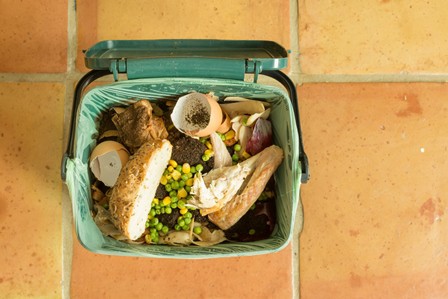Operators of anaerobic digestor plants have signalled that concerns about plastic being found in digestate for spreading on fields will be reduced if guidance published this week by WRAP is followed.

Liners: three main different types are available (see chart below)
But, it is unclear what the sector’s stance is on the plastic liners themselves although WRAP has emphasised that a balance is needed between tackling food waste with plastic liners and reducing the impact of plastic on the planet.
In the wake of the Food Waste Recycling Action Programme’s preference for plastic liners (see letsrecycle.com story), it has been estimated that if each of the UK’s 27 million households used just one plastic liner a week this would see 1.4 billion plastic liner bags used per annum. This comes at a time when plastics are under scrutiny in the sea and on the land.
Relationship
Charlotte Morton, chief executive of ADBA, one of the asssociation’s representing food waste plant operators, said: “WRAP’s guidance highlights that what is important in terms of caddy liners is the relationship and communication between producers of food waste, those collecting the food waste, and operators recycling the food waste through anaerobic digestion. The guidance shows that if this relationship works well contractually, and the necessary equipment is used to treat either biodegradable or plastic liners, then the process should produce a quality digestate by-product with minimum levels of plastic or other inorganic material.”
Ms Morton continued: “ADBA wants to work with operators, WRAP, and others over the coming years to decide whether a consistent approach across the country may be more appropriate than the current differing arrangements between producers, collectors and operators. It is also important to look at the bigger picture in terms of the quantity and quality of resources captured and recycled and the quality of the outputs, allowing both the value of inputs and the quality of the outputs to be maximised.”

Bag levy
On the topic of plastic liners and the placing of them into the consumer marketplace as pressure grows to reduce the amount of plastic including by a levy on plastic bags, ADBA opted not to comment specifically but did welcome the 5p bag tax “and the positive message it sends out on sustainable consumption”. However, it emphasised the reduction being achieved in plastic in digestate and pointed to its new Assurance Scheme to be unveiled next month.
Legitimate concerns
WRAP spoke of the “legitimate” concerns about the amount of plastic on the market and pointed to a need to find solutions.
Mike Falconer Hall, programme area manager for organics at WRAP said: “The aim of the FWRAP plan is to divert the amount of food waste that currently goes to landfill into AD and IVC and to come up with solutions to tackle the real or perceived barriers to achieving that.
“It is important that we find ways to strike the balance between tackling food waste and reducing the impact of plastic on the planet.”
Mike Falconer-Hall
Programme Area Manager for Organics
“We know that caddy liners encourage householders to recycle their food waste. As a result more local authorities allow the use of liners including compostable starched base liners, paper or PE ones, depending on arrangements they have with treatment plant operators.
“There are a number of possible end destinations for PE and compostable liners once they’ve been removed from the food waste at AD. If the compostable liners can be segregated from other packaging they can be sent to in vessel composting and turned into compost. If PE liners can be separated from other packaging they can be washed and recycled. However, currently the most likely destination for PE and compostable liners is either energy from waste or landfill.
“With the current legitimate concern about the amount of plastic on the market, it is important that we find ways to strike the balance between tackling food waste and reducing the impact of plastic on the planet. Landfill should always be the last resort and we will continue to engage with food waste recyclers to find solutions which are economically and environmentally viable, as well as practical for householders.”
The post Balance needed over food waste and plastic liners, says WRAP appeared first on letsrecycle.com.
Source: letsrecycle.com Plastic



